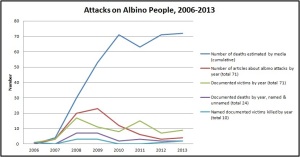Internews describes itself as an "international non-profit organization whose mission is to empower local media worldwide to give people the news and information they need, the ability to connect and the means to make their voices heard". But one of their much trumpeted programs claims to train journalists about the 'science' behind mass male circumcision programs in Kenya and creating demand for the procedure. There's quite a difference between training journalists on the 'science' of circumcision and creating demand, and the latter generally has little to do with empowerment.
A press release gushes: "Internews’ training approach illustrates the benefits of training journalists to report accurately and impartially on culturally sensitive topics, such as VMMC. The training resulted in some 100 news stories focused on this high impact HIV prevention procedure that were published or broadcast. What was notable was that the media did not carry any negative news stories about the topic during the period that Kenya was rolling out the medical procedure in Nyanza Province." Oddly, another version of this press release uses the term "falsely negative news stories"; I wonder which is correct? Or is any negative news story 'falsely negative'?
So where is the impartiality in creating demand for mass male circumcision? If people have reservations about circumcision perhaps they have good reasons to. But if the procedure is as wonderful as proponents claim it is, why should such aggressive demand creation be necessary? It is claimed that Internews training "does not prescribe to journalists what to cover" but that their main concern is accuracy. Yet their country director Ida Jooste, perhaps inadvertently, flatly contradicts this claim.
She says that a "critical article was published in Uganda about VMMC quoting a poor-quality study which attacked the credibility" of the often cited Randomised Controlled Trials that took place in Kenya, Uganda and South Africa. Without citing that 'poor-quality' study, she goes on: "Rather than wait for the Kenyan media to pick up and run the story, Internews proactively convened a round-table with journalists and VMMC experts from the National AIDS and STI Control Program, and other organizations to analyze the story and examine its scientific arguments. As a result, not a single media outlet in Kenya chose to pick up or run the sensational story."
I don't think I'd use the word 'impartial' there. Ensuring that only positive coverage is aired and that negative coverage is quashed is media censorship and control, pure and simple. This is all paid for by the US taxpayer, though it seems the UK may now have something to do with it too.
Internews also 'worked with' (should that be 'worked on'?) civil society and health agencies working in the field of mass male circumcision. When they ran a conference focusing on women's 'involvement' in mass male circumcision, "to their delight" this resulted in 25 news and feature stories. This is pure manipulation, but those involved seem to express no shame, apology or even justification for it. Joost is even cited as saying "We believe that the impact of positive media coverage, or at the very least, the absence of negative coverage, complements and reinforces traditional public campaigns aimed at creating demand and behaviour change".
The above illustrates a concerted effort by a donor (Gates), an international media outlet (the BBC, via its corporate social responsibility wing) and a well-funded US non-profit, to control the Kenyan media. These parties then openly report their successful manipulation and censorship of the media, which has resulted in completely biased coverage of a public health program that is opposed by many of those who have taken the time to inform themselves about it.
What kind of foreign donor funded public health program, only carried out on certain African populations, is so important that it is necessary to manipulate the press so that they only report positive stories and that they don't report negative stories about it? If Kenyan people had any objections to this kind of neo-imperialism, would their press even report it? If the US wanted to impose a mass male circumcision program in the UK, would the BBC also collude with Gates, PEPFAR, CDC, UNAIDS and other parties to make sure objections were not heard? This must be what is meant by 'informed consent'.


